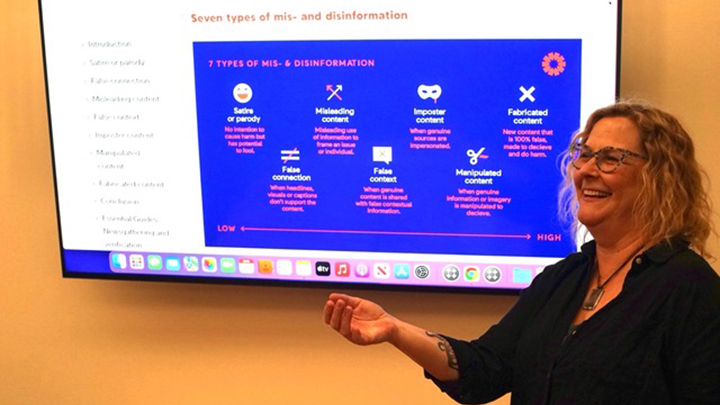What to Do About Misinformation? A New Course Prepares Students for 2024 and Beyond

If you have been following the news over the past few years, one concern you have heard is about 'misinformation.' Perhaps you were seeking information about the COVID-19 vaccine, or about the position that a candidate for political office took on immigration reform, or maybe you heard that generative AI tools like ChatGPT can 'hallucinate' when you ask them a question. The common denominator across these examples, and many others, is misinformation and how to detect it in our everyday lives. Students taking Online Learning Librarian Rebecca Nowicki's new course, “Fighting Misinformation: Locating and Using Reliable Sources for College and Everyday Life" (HON 113) are prepared to understand the sources of information and how we can use information in college and beyond.
Nowicki is passionate about helping students understand how information fits into their lives. She says, “Just because we live in a world where information is easy to access doesn’t mean we are getting information that actually meets our needs. Ideas do not come out of a vacuum. The ideas you have and the decisions you make are all dependent on the quality of information that you have to inform those ideas and decisions, so you need to understand the information so you can be selective about what information you use.”
“Fighting Misinformation” is a seminar-style class that features discussions, group projects, and peer-to-peer teaching and learning to help students develop critical information literacy competencies. The goal is to empower students to be advocates of their information hygiene and help encourage others to clean the information environment, says Nowicki.
Nowicki points out that scholarship is an exploration rather than a static statement of facts. It builds on itself as each new scholar asks, “What is missing?” and “What are the structural biases inherent in how information is created and disseminated?” She strives to help her students think critically about what information looks like now and how to ethically incorporate it into their research and lives.
Librarians are uniquely suited to teach this type of course both because of the interdisciplinary nature of their work and because, as information professionals, they have made the continuously changing information environment their particular area of expertise. They can help students focus on examining information beyond using it to fulfill a specific educational goal or narrowly focus on the information that is useful for just a specific subject. The class also hears from several subject specialist librarians who share their expertise, exposing them to diverse information sources and uses.
The class has been well received. As one of their final course assignments, students write a letter reflecting on what they have learned and 'advice to a future student’. Most have centered on the impact of the course on their work and the changes it made to how they viewed information.
“This is the best course you can take! You will most definitely apply what Mrs. Nowicki teaches you outside of the classroom. It's a good feeling, knowing that you're well-equipped to face the world of information. Enjoy!”
– Maitland Klingberg ‘24“Prepare to be immersed and dive into a new realm that is misinformation. You will discover internalized stereotypes, associations and biases you may not have known existed hiding behind algorithms and coding or even within yourself. My advice for you is to enter the class with an open mind and really delve into the readings and materials as they will help supplement class discussions. Overall, this class will leave you with a new outlook on our society, social media, technology, and information!”
– Marlene Baldonado ‘25
Nowicki hopes this course will continue to grow and can be offered to larger groups of students as there is a whirlpool of false information in today’s political realm and world events. She emphasizes that “You cannot make good decisions without good information!”

